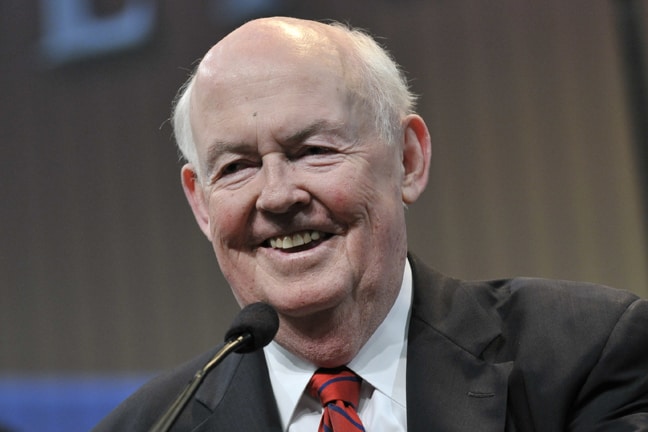
Brishen Rogers is an Associate Professor of Law at Temple University, a Visiting Professor at Georgetown University Law Center (Fall 2019), and a Fellow at the Roosevelt Institute.
Héctor Figueroa hired me into my first job in the labor movement. In 2000, he and a new leadership team began at SEIU Local 32BJ, the massive building services union centered in New York City. Héctor was initially the Secretary-Treasurer (essentially the third-in-command) and political director. One of the union’s first major initiatives was to bring the Justice for Janitors campaign to New Jersey. Héctor hired me as a political and community organizer on that effort, and we worked closely together until 2003.
I had already been a community organizer for a few years—but the New Jersey Justice for Janitors campaign was unlike anything I’d ever experienced. While janitors in New York city made over $30/hour, those just across the river often made minimum wage or even less. Virtually all were subcontracted (“fissured”) but worked in gleaming office towers owned and occupied by very profitable large corporations. They lived in overcrowded, run-down apartments. Some were required to use industrial cleaning products without gloves, so that they often developed lesions on their hands. Others were bused into remote office complexes by the sub-contractors who employed them, quickly herded into the buildings so they could not talk to organizers, and locked in during their shifts. One of those vans nearly ran over some of us in an effort to avoid letting the workers even see that a union was nearby.
What I remember most vividly, though, isn’t the repression, but the workers’ courage. Many were ready to organize and strike as soon as we met them. Between their low pay, their treatment as second-class citizens, and the contradiction between their expectations and the realities of life in the U.S., their workplaces and communities were a tinderbox. Within a few weeks of starting the campaign, hundreds went on strike in downtown Jersey City, streaming out of their office buildings, marching up and down the streets banging on plastic drums, and shouting at the top of their lungs. Those strikes weren’t just a protest, or a means of putting pressure on cleaning contractors. For many workers, it was the first time in their lives that they’d been able to confront their employer or someone else with power over them.
After that, they just were a union, for all practical purposes, months or even years before they officially won NLRB certification. The campaign then steamrolled forward, to Bergen County, Morris and Essex Counties, to Newark (where we staged another massive rally that attracted at least four police helicopters and hundreds of police), then on to South Jersey. The workers won again, and again, and again, in many cases tripling their wages.
While Héctor wasn’t formally running the campaign, he was a top union strategist, and he was on the ground with us constantly, connecting personally with the workers who had stepped out, identifying new leaders, pushing them into action. The workers led the campaign, in many ways he was its moral center. I learned more about power, politics, and economics – about how this country really operates, and how it could be better – in my first three months at 32BJ than I did anywhere before or since.
But Héctor was more than an effective organizer. He had, and he imparted, a compelling vision of a better America. This was clear in his staffing decisions. We were white, black, and Latinx, native-born and not, younger and older, straight, gay, and queer. It was also apparent in how he wove together workers’ rights, immigrant rights, and civil rights in our campaigns from day one. Héctor was a leader in fights for immigrant rights for decades, and one of the first labor leaders to support the Movement for Black Lives. To this day, I often forget that most people’s vision of the labor movement is of stodgy, male, white-dominated clubs straight out of the 1950s. Héctor’s 32BJ looks nothing like that.
What’s more, those campaigns helped point toward a better labor law. Like other Justice for Janitors campaigns, 32BJ’s efforts had to work around Taft-Hartley’s secondary boycott restrictions, since workers were almost all subcontracted. And the 32BJ strategy has been to build large bargaining units of many employers at the county or even state level, which is a sort of sectoral bargaining. Héctor was also deeply involved in the Fight for $15 and other innovative organizing, and he had recently been pushing to ensure full employment law rights for gig economy workers.
Héctor did all of this with grace and aplomb. He was powerful, and knew how to use his power effectively, and yet he didn’t do so for self-aggrandizement or to settle petty grievances. He married his deep knowledge of economics and his skills as a tactician and leader, with clear-eyed political judgment and a vision that will endure. His untimely death is an enormous loss for today’s freedom movements. And he will be missed.









Daily News & Commentary
Start your day with our roundup of the latest labor developments. See all
July 14
More circuits weigh in on two-step certification; Uber challengers Seattle deactivation ordinance.
July 13
APWU and USPS ratify a new contract, ICE barred from racial profiling in Los Angeles, and the fight continues over the dismantling of NIOSH
July 11
Regional director orders election without Board quorum; 9th Circuit pauses injunction on Executive Order; Driverless car legislation in Massachusetts
July 10
Wisconsin Supreme Court holds UW Health nurses are not covered by Wisconsin’s Labor Peace Act; a district judge denies the request to stay an injunction pending appeal; the NFLPA appeals an arbitration decision.
July 9
the Supreme Court allows Trump to proceed with mass firings; Secretary of Agriculture suggests Medicaid recipients replace deported migrant farmworkers; DHS ends TPS for Nicaragua and Honduras
July 8
In today’s news and commentary, Apple wins at the Fifth Circuit against the NLRB, Florida enacts a noncompete-friendly law, and complications with the No Tax on Tips in the Big Beautiful Bill. Apple won an appeal overturning a National Labor Relations Board (NLRB) decision that the company violated labor law by coercively questioning an employee […]